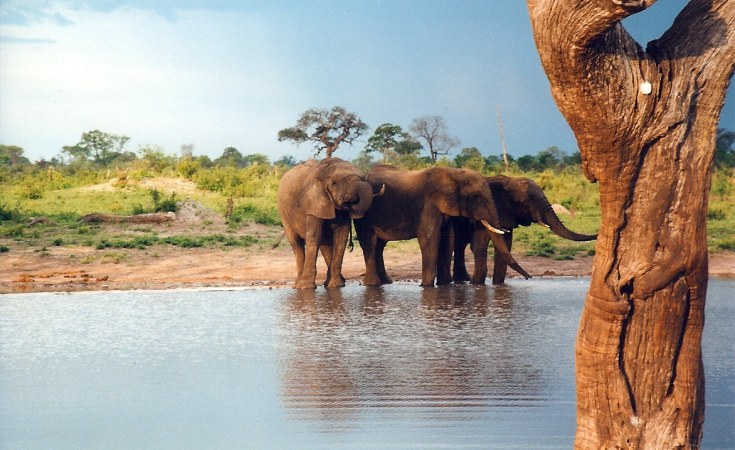Maun, Botswana — Europe's plans to ban the importation of trophy hunting products are unjust and pose a huge threat to conservation that centres on the people in southern African rangeland countries, wildlife ecologists say.
Prof Richard Fynn, an ecologist at the Okavango Research Institute of the University of Botswana told journalists drawn from Sadc countries that banning trophy hunting can have detrimental effects on the livelihoods of local communities and perpetuate colonial injustices.
"The ban on trophy hunting can harm conservation that centres on the people, the local communities that know and depend on their environment and has been vital in the conservation and protection of wildlife resources," he said.
"The rights of local communities to make decisions about their own resources are taken away. Western countries still perpetuate colonial injustices by adopting stringent measures that affect the livelihoods of local communities not only here in Botswana but in Africa as a whole."
Prof Fynn said past colonial social injustice in conservation, such as land grabs and strict conservation enclosures, forced displacement and exclusion of local communities from their natural resources.
The veteran ecologist said these experiences together with the latest moves by Europe to ban trophy hunting products exacerbated conflicts within and among local communities and negatively influenced support for conservation initiatives.
"Local communities are often disenfranchised by wildlife conservation. They lose land, they get huge human-wildlife conflicts and this a very unjust system," he said.
"This happens throughout Africa. Conservation has a colonial legacy with a top-down approach. Western countries strongly enforce this approach which is animal rights-based rather than people rights-based. This causes problems."
In addition, Prof Fynn said the ban on trophy hunting products by Europe will hit local communities hardest in Botswana and the whole southern African region.
The ban, he said, would have a collateral negative impact on neighbouring countries such as Namibia, Zimbabwe, South Africa and Zambia.
"African countries working with their local communities can stop runaway poaching. The West is still pushing for Western ways of doing conservation," he said.
"lt is very unjust. They are still trying to control how African governments do their wildlife conservation.
"This undermines efforts to undertake wildlife conservation for the people by the people. Communities can play a critical role."
Hunting is a major revenue generator for the southern African rangeland countries and this has faced fierce opposition from animal rights and welfare activists in Europe and North America.
Proceeds from trophy hunts in Botswana, Zimbabwe, Namibia, South Africa, Tanzania and Zambia help to reduce the impact of human-wildlife conflicts on community livelihoods.
Countries like the UK and France are in the process of considering legislation which prohibits hunting trophies from entering their territories while others like Canada and Belgium have even gone as far as to completely ban the import of hunting trophies.
Local communities, governments, NGOs, researchers and most tourism players fear that if the bill goes through in the UK to ban trophy hunting and trophy products, there will be a knock-on effect in Europe.
France and Finland are considering it and Belgium has banned trophy hunting products completely.
A hunting trophy ban in Italy is also a possibility.
Prof Joseph Mbaiwa of the University of Botswana said the hunting trophy ban would hurt conservation efforts by local communities and bankrupt them.
"Conservation will be hurt. You conserve because you see the benefits. If you don't benefit why should you conserve," he said.
"We need to market the benefits of trophy hunting more aggressively. We must tell the world as a region that trophy hunting is for development."
Southern African countries under the Kavango-Zambezi Trans-Frontier Conservation Area (KAZA) are home to about 230,000 elephants, thanks to good wildlife management practices and community-based natural resources initiatives.
"They know they can't influence legislation in Africa now. So, they are turning to emotional stances like wanting to ban trophy imports. It is a product of colonial legacy where they think they can still control our wildlife even from European capitals," said Prof Fynn.
"Trophy hunting is a just and ethical way for local communities to derive benefits that improve their livelihoods. It has a critical way in making sure that it brings benefits to local communities."
Apart from the trophy bans, a massive drive to shut down ivory trade worldwide has left Southern African elephant rangeland countries with virtually no markets to sell their ivory.
The ivory ban has left most SADC countries stuck with hundreds of tonnes of unsold ivory.
Had controlled trade been permitted, the countries could have generated revenue that could support animal welfare and protection as well as local communities.
Southern African nations including Botswana, Namibia, Zimbabwe, South Africa and Zambia have for years been battling the global wildlife trade regulator to grant them rights to sell ivory acquired through natural deaths, confiscations and culling.
The countries are home to the world's largest elephant population.
The big herds, faced with shrinking forest cover and human encroachment of their corridors, venture into human settlements looking for food and attack those who try to stop them.
This has led to the unending human-wildlife conflict among local communities living in areas adjacent to game sanctuaries.
Zimbabwe and most other SADC countries have not benefited substantially from the wildlife resources due to the Cites' ban on the ivory trade.
Zimbabwe and most other SADC countries are sitting on tonnes of ivory which they cannot dispose of owing to a Cites ban.
The country is sitting on ivory and rhino horn stockpiles worth US$600 million.
Southern Africa is home to half of Africa's elephants and Zimbabwe's population of more than 84 000 against a carrying capacity of 40 000, is only second to that of Botswana in the world.
SADC countries often stand nearly alone in opposing the destruction of illegal ivory stockpiles and a total ban on the ivory trade among a slew of measures widely believed to combat poaching.


